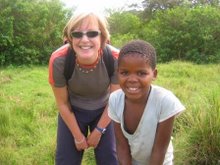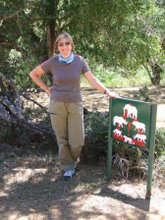Harar: City of solidarity, peace and tolerance; UNESCO World Heritage site; Fourth holiest city of Islam; Timbuktoo of the East. Where do you start?
Initially we'd thought we wouldn't get to Harar - it's a day's travel to the east of Addis Ababa, and not on the way to anywhere except Djibouti. Our time is now limited by the dates on our Sudanese visa, which have left us a bare four weeks to get to the border. And we are determined to have a good look at the monasteries (those that permit female visitors anyway), rock hewn churches and religious sites that are scattered around the so-called "historical northern circuit" of Ethippia. However, in the end we couldn't resist the allure of all the labels that Harar (or more properly, the old walled city of Jugel, within Harar) carries.
So off we went. The bus left (of course) at 5, which meant a 4.15 wake up, out on the street looking for a minibus by 4.40 for the short ride to the bus depot. We were collected in a taxi by Yontin (sp?), an Israeli I'd been chatting to the night before (who we subsequently nicknamed TinTin) and whisked to the Auto Terre in moments and popped on a bus to DireDawa, kind of en route to Harar. Everything went according to plan. The bus left at 6am, meandered only slightly through the still-dark streets of Addis, and then we were off on yet another fabulous Ethiopian road. This road though is strategically important for the country, linking the capital with their only accessible port at Djibouti. This accounted for the numerous customs checkpoints, which while tiresome on the way out, were downright inconvenient on the way back. Easy to figure out which way the smuggling traffic goes.
The trip took till round 4 in the afternoon, and the road took us past truck loads of camels, along the railway line (also terminating in Djibouti - at one point we had considered the train, but reading about the daily scrum to get a ticket, and a seat, and that it would take at least 20 hours soon had us happily contemplating yet another day of our lives on a bus!), past volcanoes, a lake and through some spectacular hillside country (and this isn't even the highlands). Wednesday and Friday are fasting days for Orthodox Ethiopian Christians (sometimes this is translated as "fast food" on menus, though it's anything but) which meant freshly cooked, delicious lentil samosas for breakfast on the side of the road. A steal at two for a birr (six birr to one NZ$). There was a festival in Kulibi, not far from the T-junction where the road splits - left to DireDawa, right to Harar - and many on the bus were headed there. Close to the village of Kulibi, notable only for the relatively new (ie, less than 100 years old) church on the hill which is the focus for the celebration held twice yearly, 26 July and 26 Dec, the bus conductor doled out little tickets for the faithful, giving them entrance to the bus company's marquee. We pulled into a big muddy field and off they all got. There were tents and pilgrims everywhere; it was busy and colourful and reminded me of the site of an outdoor rock concert, heathen that I am!
Our much emptier bus then dropped us off at the T-junction a few km later, and we were lucky enough to get straight onto a minibus going to Harar, for a mere 10 birr. It's mango season, and they must grow around here. We bought delicious mini-mangoes for 50 cents each (that's half a birr, which makes them almost free).
By the time we'd got to Harar, found a hotel, had a shower and a beer, we decided to postpone our exploring till the next day. We hadn't really eaten anything all day (except those long-ago samosas), and the restaurant at the Tewodros Hotel had been recommended. I can only reiterate those recommendations; a big bowl of spaghetti with tomato sauce, and a vegetable salad hit the spot. We chatted to a fellow diner, a captain in the Ethiopian army, who seemed keen to practice his English and offered to show us to the hyena man the next night.
The rain that was such a feature of Addis was blissfully absent in the east, probably not surprising since we were (according to my Michelin map anyway) not far from the notorious and empty Somalian deserts. It was nice to spend a few hours the next day wandering the narrow cobbled alleys of Jugal, counting mosques (there are apparently 99, together with one Orthodox church and one French Catholic Mission, but we never found this), checking out the market which was full of salt in large uncrushed piles, chillies, onions, and other produce, and talking to and photographing some of the many children. We stumbled upon a museum, which incredibly housed a huge array of old texts, hundreds of years old that in Europe would be kept in controlled atmospheric conditions, and touched only by the gloved hands of the initiated. Not here - the private collection was owned by Abdallah Ali Shariff and his wife, who had spent 17 years putting it together - and Mr Shariff proudly showed us round, pointing out gold leaf, wooden book covers, vellum and parchment pages and authentic old bindings, and some that he'd restored himself. Together with an eclectic collection of local clothing, weapons, coins, bookbinding and scribing equipment it added up to an insight into the cultural riches and diversity of the area.
We spent the afternoon in the company of our soldier, visiting Rambo House (OK, Rimbaud House - the French poet Arthur Rimbaud lived here for a number of years and the French, together with a host of commercial sponsors, have restored his house) where there was an exhibition of photographs from Rimbaud's two towns, Harar and Charleville in France. The house was three stories high, with great views across the valleys from the top floor.
So, finally to the hyena man. This was another Ethiopian oddity, a weird kind of practice, that isn't even that old (round 50 years as far as we can tell) but that has attracted a vaguely fanatical following and a layer of mystery and obfuscation that Ethiopians routinely use to add wonder and magic to just about anything (wait till I get to the bit about how they make coffee!). About 7.30 in the evening, outside the Erer Gate, we joined a small throng of locals and tourists to watch as a local guy with a yellow plastic bucket of goat bits and pieces threw out chunks of the meat to the waiting hyenas. There was nothing mystical about these beasts. They were classic spotted hyenas, strong, solid and definitely carnivorous. After foxing about for a while, for our benefit I'm sure, both man and beast got down to the point of the evening and soon the hyenas were taking meat from a stick the man held in his mouth. Crazy, but hey this is Ethiopia and it almost seemed natural. Not quite natural enough for anyone else to try though.
So that was Harar, it just remained for us to get up early the next morning, and head back to the bus station for our 5am bus. We had decided to buy a ticket the day before because of the crowds in town for the festival, and clutching our Ethiopian Long Distance Bus Drivers' Association bits of paper boarded a perfectly tidy and reliable-looking vehicle and waited for the inevitable 6am departure. All was going fine, until we got to the T-junction, where we stopped, and didn't start again. After about 3 hours a replacement bus arrived, and after a 20 minute "discussion" about money, we headed up the hill towards Addis. The replacement bus, and bus driver, were not really up to the task of a 500km trip, and it was a long slow ride back to the capital, not helped by the virtual absence of headlights which made driving after dark particularly tedious. We didn't get back to the bus depot till round 10:30, and while we were lucky to get a taxi straight away our arrival at the Baro Hotel was greeted with a frown. They had given our room away, only holding it till 8pm. I could understand why they had done this, but that didn't mean I was happy about it. The night receptionist was all for heaving us out onto the street, but I wasn't going anywhere. He made a few calls to try and find alternative accommodation, to no avail. Luckily (and somewhat incredibly) the kitchen was still open, so after wolfing some macaroni we grabbed our sleeping bags and bunked down on the bench seats in the verandah - probably displacing several staff persons in the process! It was either surprisingly comfortable, or we were completely shattered. No matter - we slept soundly till woken firstly by a classic thunderstorm, and then by the night receptionist round 6am advising that he'd prepared a room for us. Some other lucky person had obviously had to catch an early bus. Not quite the end to our wee vaunt we'd hoped for, but in the end no harm done - and now we can say that we have seen Harar, and its hyena man.
Sunday, 29 July 2007
Subscribe to:
Post Comments (Atom)




No comments:
Post a Comment